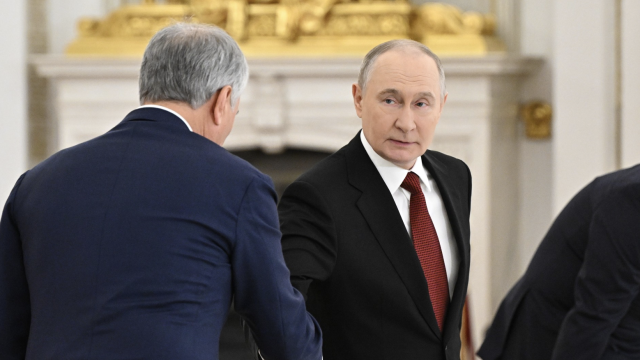U.S. Secretary of State John Kerry arrived Tuesday in Moscow for talks with President Vladimir Putin that are expected to largely focus on ways to end the two-year civil war in Syria.
Foreign Minister Sergei Lavrov has voiced hopes that Kerry's visit will allow Russia and the U.S. to find a political resolution to the Syrian crisis instead of a military one.
Lavrov, speaking Friday, said the visit should help the Russian government prepare "a most specific" reply to a confidential message that U.S. President Barack Obama sent to Putin last month. The message was passed to the Kremlin by Obama's national security adviser, who visited in late April.
The U.S., which has supplied rebels with non-military equipment in Syria, has urged Russia, which has sold weapons to the government of President Bashar Assad for years, to stop supporting Assad.
Kerry and Putin are also expected to discuss U.S. plans to build an anti-missile shield in Europe, Russia's ban on U.S. adoptions of children, and civil freedoms in Russia, Lavrov said.
Alexei Pushkov, head of the State Duma's International Affairs Committee, told Interfax that Putin and Kerry might also talk about North Korea, cooperation in Afghanistan and the agenda of an upcoming meeting of Putin and Obama at a Group of Eight summit in Northern Ireland in late June.
Kerry's two-day trip is his first to Russia after his appointment as the United States' top diplomat in February. His plane landed at Vnukovo-2 Airport on Monday morning.
Political analyst Sergei Karaganov said Kerry's appointment might help improve bilateral relations. He said ties were "distinctly cool" under former State Secretary Hillary Clinton, who "irritated many" Russian officials by her habit to "teach moral values," according to Interfax.
Alexei Makarkin, deputy head of the Center for Political Technologies, predicted that Kerry's talks with Putin would be "complicated" due to "very different views" over Syria's future and Russia's "cautious attitude" on the anti-missile shield, Interfax said.
Related articles:
A Message from The Moscow Times:
Dear readers,
We are facing unprecedented challenges. Russia's Prosecutor General's Office has designated The Moscow Times as an "undesirable" organization, criminalizing our work and putting our staff at risk of prosecution. This follows our earlier unjust labeling as a "foreign agent."
These actions are direct attempts to silence independent journalism in Russia. The authorities claim our work "discredits the decisions of the Russian leadership." We see things differently: we strive to provide accurate, unbiased reporting on Russia.
We, the journalists of The Moscow Times, refuse to be silenced. But to continue our work, we need your help.
Your support, no matter how small, makes a world of difference. If you can, please support us monthly starting from just $2. It's quick to set up, and every contribution makes a significant impact.
By supporting The Moscow Times, you're defending open, independent journalism in the face of repression. Thank you for standing with us.
Remind me later.





